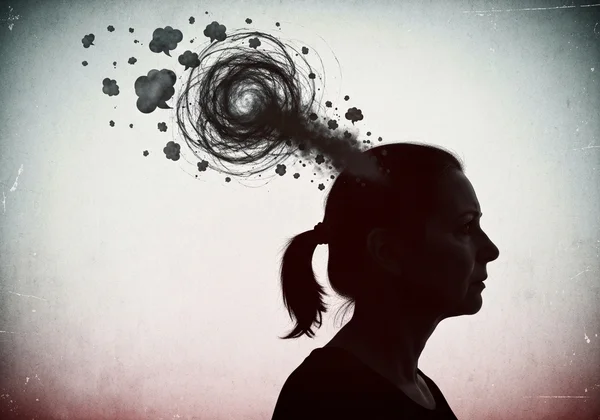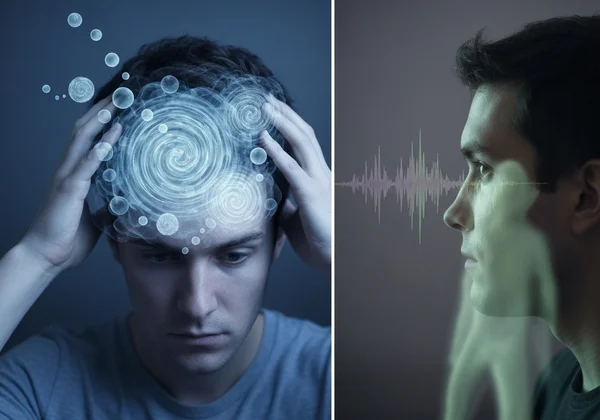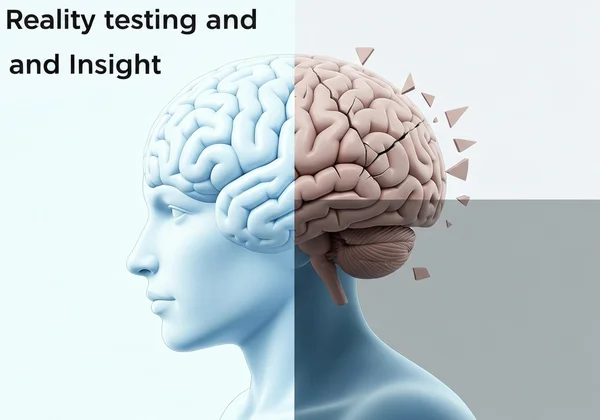Pensamientos Intrusivos vs. Psicosis Temprana: Haz una Evaluación Gratuita de Esquizofrenia para Mayor Claridad
El miedo a "volverse loco" es una experiencia potente y angustiante, especialmente cuando tu mente está llena de pensamientos no deseados. Es posible que te encuentres buscando una evaluación de esquizofrenia, una pregunta válida y profundamente personal. La confusión entre la ansiedad severa con pensamientos intrusivos y los primeros signos de psicosis es común. Este artículo ofrece claridad, explorando las diferencias entre estas experiencias y guiándote hacia los siguientes pasos responsables, como realizar una evaluación preliminar de esquizofrenia en línea.
Entendiendo los Pensamientos Intrusivos: Una Experiencia Común de Ansiedad y TOC
Antes de poder establecer comparaciones, es esencial comprender qué son realmente los pensamientos intrusivos. Lejos de ser un signo de psicosis inminente, son una experiencia característica de los trastornos de ansiedad y el Trastorno Obsesivo-Compulsivo (TOC). Pueden sentirse aterradores, pero comprender su naturaleza es el primer paso para manejarlos.
¿Qué Son Exactamente los Pensamientos Intrusivos y Por Qué Ocurren?
Los pensamientos intrusivos son pensamientos, imágenes o impulsos no deseados y a menudo angustiantes que entran repentinamente en tu mente. Suelen ser "ego-distónicos", lo que significa que contradicen tus valores y carácter genuinos. Por ejemplo, un padre amoroso podría tener un pensamiento intrusivo y horrible sobre dañar a su hijo. Esto no refleja un deseo secreto; es la ansiedad aferrándose a un miedo profundo. Aunque casi todo el mundo experimenta pensamientos extraños pasajeros, para quienes tienen ansiedad o TOC, estos se vuelven persistentes y difíciles de ignorar.
Cómo la Ansiedad y el TOC Alimentan los Pensamientos Intrusivos Angustiantes
Normalmente, un pensamiento extraño se descarta rápidamente. Sin embargo, con la ansiedad o el TOC, el "sistema de alarma" del cerebro reacciona de forma exagerada, interpretando el pensamiento como una amenaza significativa o un reflejo de tu carácter. Esto desencadena un círculo vicioso: el pensamiento causa ansiedad, luchas por suprimirlo, y este esfuerzo irónicamente le da más poder al pensamiento, haciendo que regrese con más fuerza. La verdadera angustia no proviene del pensamiento inicial, sino del miedo y el significado que le asignas.

El Miedo a "Desarrollar Esquizofrenia": Un Tema Específico de Ansiedad
Para algunos, el contenido de los pensamientos intrusivos se centra específicamente en la salud mental. Una obsesión común es el miedo a perder la cordura o a desarrollar una enfermedad mental grave como la esquizofrenia. Podrías monitorear constantemente tus propios pensamientos y percepciones, buscando signos de psicosis. Cada sonido extraño o pensamiento fugaz y peculiar puede sentirse como una prueba de que tu peor miedo se está haciendo realidad. Esta hipervigilancia es un patrón clásico de ansiedad y es fundamentalmente diferente de la experiencia real de la psicosis.
Decodificando la Psicosis: Signos Tempranos Más Allá de las Ansiedades Comunes
Ahora, cambiemos nuestro enfoque a la psicosis. La psicosis no es una enfermedad en sí misma, sino un conjunto de síntomas que implican una desconexión de la realidad. Es una característica central de la esquizofrenia y otros trastornos psicóticos. Comprender estos síntomas es crucial para distinguirlos de las experiencias de ansiedad.
¿Qué es la Psicosis? Entendiendo una Ruptura con la Realidad
La psicosis describe una condición en la que los pensamientos y percepciones de un individuo están alterados, lo que les dificulta reconocer qué es real y qué no. Esto no se trata de tener pensamientos no deseados que sabes que son irracionales (como en el TOC); se trata de experimentar cosas que no están ahí o creer cosas que son demostrablemente falsas, y sentir que estas experiencias son completamente reales. Esta diferencia fundamental en la introspección es una distinción crítica.
Alucinaciones vs. Pensamientos Intrusivos: Diferencias Clave en la Percepción
Este es un punto clave de confusión. Una alucinación es una experiencia sensorial sin un estímulo externo, como escuchar voces (auditivas) o ver cosas (visuales) que otros no ven. Crucialmente, la persona percibe la alucinación como real. En contraste, un pensamiento intrusivo es un evento mental interno. Eres consciente de que el pensamiento o la imagen angustiante es un producto de tu propia mente, no una realidad externa.

Delirios: Cuando las Creencias Son Fijas y Falsas
Un delirio es una creencia fija y falsa que es resistente a la razón o a la evidencia contradictoria. No son solo preocupaciones o miedos; son convicciones firmes. Los ejemplos incluyen delirios paranoides (creer que te están siguiendo o conspirando contra ti) o delirios de grandeza (creer que tienes poderes especiales). Alguien con un miedo impulsado por la ansiedad a ser observado podría preocuparse, "¿Y si alguien me está espiando?". Alguien con un delirio paranoide cree, "Yo sé que el FBI ha intervenido mi apartamento". La convicción es inquebrantable.
Pensamiento y Habla Desorganizados: Una Mirada Más Cercana a los Cambios Cognitivos
Un signo clave de la psicosis implica cambios en los procesos de pensamiento y el habla. Esto puede manifestarse como un habla desorganizada que es difícil de seguir, saltando rápidamente entre temas no relacionados ("ensalada de palabras"), o una interrupción repentina en el pensamiento ("bloqueo del pensamiento"). Esto es diferente de los pensamientos acelerados de la ansiedad, que, aunque abrumadores, suelen seguir un hilo lógico (aunque a menudo catastrófico).
Distinciones Clave: Ansiedad, Pensamientos Intrusivos y Esquizofrenia Temprana
Unamos todo. Distinguir entre estas condiciones a menudo se reduce a dos conceptos centrales: tu relación con la realidad y cómo los síntomas impactan tu vida.
Prueba de Realidad e Introspección: ¿Quién Sabe Qué es Real?
Esta es la distinción más crítica. Alguien con ansiedad severa o TOC retiene la introspección. Saben que sus pensamientos intrusivos son irracionales y generados por su propia mente; la angustia proviene de esta conciencia. En contraste, una persona que experimenta psicosis tiene una prueba de realidad deteriorada. Perciben sus alucinaciones y delirios como eventos reales y externos. Esta falta de introspección es una característica principal de una condición psicótica.

Respuesta Emocional y Deterioro: Cómo los Síntomas Afectan la Vida
La respuesta emocional también difiere. Con la ansiedad, la emoción principal es un miedo intenso a los pensamientos. La persona lucha activamente contra ellos. En la psicosis temprana, las emociones pueden volverse "planas" o inapropiadas para la situación. Junto con el miedo, a menudo hay confusión, retraimiento y una creciente desconexión de los demás a medida que la realidad interna de la persona se vuelve más absorbente. Si bien ambas condiciones pueden ser debilitantes, afectan el funcionamiento diario de maneras distintas.
Cuándo Buscar Ayuda Profesional: Tus Siguientes Pasos Hacia la Claridad
Si estás luchando con pensamientos angustiantes y un miedo abrumador, lo más importante que debes saber es que no estás solo y que la claridad es posible. El autodiagnóstico en línea puede aumentar la ansiedad, pero dar un primer paso responsable puede ser empoderador.
Reconociendo Señales Urgentes: Cuándo Consultar a un Especialista
Si tú o alguien que conoces está experimentando lo que sospechas que son alucinaciones, manteniendo creencias delirantes firmes, exhibiendo un habla desorganizada o mostrando un marcado deterioro en la higiene personal y el funcionamiento social, es crucial buscar ayuda profesional de inmediato. Estos son signos de que se necesita una evaluación exhaustiva.
Por Qué una Evaluación Profesional de Esquizofrenia es Crucial
Solo un profesional de la salud mental cualificado, como un psiquiatra o un psicólogo clínico, puede proporcionar un diagnóstico preciso. Realizarán una evaluación exhaustiva que incluye una entrevista clínica, una revisión de tu historial personal y familiar, y posiblemente otras evaluaciones para descartar diferentes condiciones. Este contexto profesional es esencial para un diagnóstico correcto y un plan de tratamiento eficaz.
Realiza una Evaluación de Esquizofrenia Gratuita y Confidencial para Obtener Información Preliminar
Aunque no sustituye un diagnóstico profesional, una herramienta de detección puede ser un primer paso valioso. Puede ayudarte a organizar tus pensamientos y proporcionarte información preliminar sobre tus experiencias. Nuestro sitio web ofrece una evaluación preliminar gratuita y confidencial basada en el Cuestionario Prodrómico. Esta herramienta está diseñada para ayudarte a comprender si tus síntomas se alinean con las señales de advertencia tempranas, dándote un punto de partida más claro para una conversación con un proveedor de atención médica.

Avanzando: Tu Camino Hacia la Claridad y el Apoyo
La línea entre la ansiedad intensa y la psicosis temprana puede sentirse borrosa y aterradora. Sin embargo, las diferencias cruciales en la introspección y la prueba de realidad pueden aportar claridad. Recuerda, preocuparse de que puedas tener esquizofrenia es a menudo un síntoma de ansiedad, no de psicosis. Tus miedos son válidos y merecen ser abordados. No dejes que la incertidumbre te mantenga en angustia. Da un paso positivo utilizando nuestra evaluación de autodiagnóstico gratuita como una forma privada y sin presión de recopilar información en tu camino hacia la tranquilidad y el apoyo profesional.
Preguntas Frecuentes Sobre Ansiedad, Psicosis y Detección de Esquizofrenia
¿Cómo sé si mis pensamientos son intrusivos o signos de psicosis?
La diferencia clave es la introspección. Si reconoces un pensamiento como irracional y producto de tu propia mente (aunque sea aterrador), es probable que sea un pensamiento intrusivo. Si crees que el pensamiento es un mensaje externo real o experimentas percepciones sensoriales como reales (por ejemplo, escuchar voces), se justifica una evaluación profesional.
¿Puede la ansiedad o el estrés severo llevar a una psicosis real?
Es raro que la ansiedad por sí sola cause psicosis. Sin embargo, el estrés severo y prolongado es un factor de riesgo, y en individuos altamente vulnerables, podría potencialmente desencadenar un episodio psicótico. Es más común que las dos condiciones se confundan o coexistan.
¿Cuáles son algunos signos tempranos de esquizofrenia en adultos jóvenes?
Los signos tempranos suelen ser sutiles, incluyendo el aislamiento social, una disminución en el rendimiento escolar o laboral, dificultad para concentrarse y emociones embotadas. También puede presentarse una creciente preocupación por ideas inusuales. Estos síntomas "prodrómicos" a menudo preceden a un episodio psicótico agudo. Para más información, puedes explorar tus síntomas.
¿Qué tipo de profesional puede distinguir con precisión estas condiciones?
Un psiquiatra es el profesional mejor cualificado para diferenciar entre condiciones complejas como el TOC y la esquizofrenia. Los psicólogos clínicos también están altamente capacitados en diagnóstico. Tu médico de atención primaria es un buen punto de partida para una derivación a un especialista.
¿Ayuda hacer una evaluación en línea de "¿Tengo esquizofrenia?"?
Sí, puede ser un primer paso útil. Una herramienta de detección bien diseñada, como la evaluación confidencial en nuestro sitio, no puede proporcionar un diagnóstico. Sin embargo, puede ofrecerte retroalimentación estructurada sobre tus síntomas y empoderarte con información para compartir con un médico, convirtiendo miedos vagos en puntos concretos para una consulta productiva.